新概念英语第二册Lesson25
新概念英语(第二册)-Lesson 25 Do the English speak English
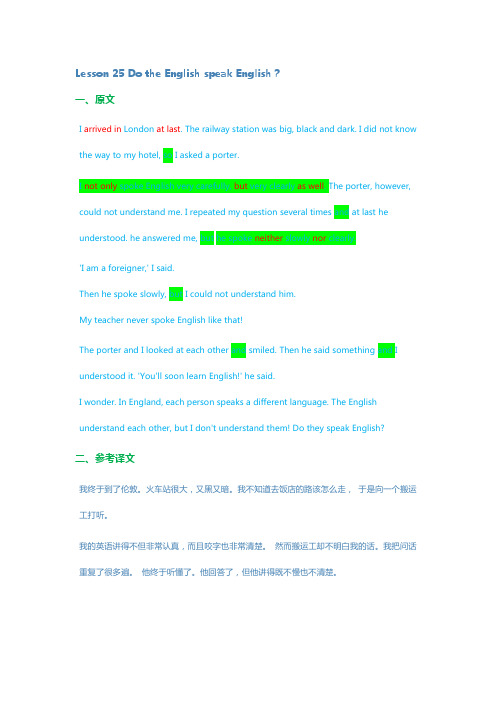
Lesson 25 Do the English speak English?一、原文I arrived in London at last. The railway station was big, black and dark. I did not know the way to my hotel, so I asked a porter.I not only spoke English very carefully, but very clearly as well. The porter, however, could not understand me. I repeated my question several times and at last he understood. he answered me, but he spoke neither slowly nor clearly.'I am a foreigner,' I said.Then he spoke slowly, but I could not understand him.My teacher never spoke English like that!The porter and I looked at each other and smiled. Then he said something and I understood it. 'You'll soon learn English!' he said.I wonder. In England, each person speaks a different language. The English understand each other, but I don't understand them! Do they speak English?二、参考译文我终于到了伦敦。
新概念英语第二册 Lesson25

Teaching Aims
• By the end of this lesson, my students will….
• 1. enjoy learning English with me. • 2. be able to write down the whole
passage basing on memory (dictation) • 3. Act out the whole story( individual,
pairs, groups)
教学步骤(单数课—60分钟)
• A。精彩导入—5分钟 • B。生词学习---6分钟 • C。视听理解及听写生成-- 10分钟 • D。逻辑推理与背景文化价值观-- 10分钟 • E。口语操练与口语产品(表演)生成-- 15
but like the Dicos as well.
Notes on the text 课文注释
4 neither…nor ...,既不…又不…,这个结构所连 接的两个否定概念也必须是对等的成分。 I neither like the KFC nor like the Dicos.
5 Iike that,像那样。介词短语作状语,修饰动词 spoke。like像......一样 Like father,like son.
station was big, black
and dark. I did not
know the way to mr.伦敦车站大且暗 ,敢问宾馆路何方。
• 逻辑:放下行李一看, 大车站黑暗一片,更 糟的是宾馆的路不知 道,作者只好问搬运 工了!下文应是问话 的内容与方式了。
新概念英语第二册25课
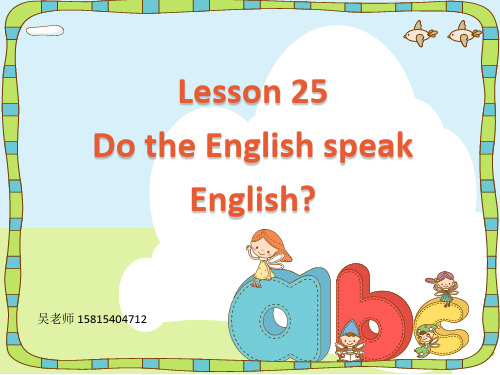
My watch is different from yours. But my shoes are the same as yours.
He answered me, but he spoke neither slowly nor clearly.
speak- spoke- spoken
My teacher never spoke English like that! There's no one like you. 没有人像你一样。
like这里是介词,表示“像,像……一样”
The porter and I looked at each other and smile
I did not know the way to my hotel...
the way to... 在去往...的路
用于问路:
• Excuse me,can you tell me the way to Beihai Park?
• Excuse me, would you like to tell me the way to Zhongshan Park?
arrive /reach / get reach vt.后接地点 【翻译】我五点钟到达公交车站。 I r_e_a_c_h_e_d__th_e__ _b_u_s__ __s_to_p_ at five o’clock.
arrive /reach / get get to+宾语 When will you get to Beijing? get home:到家,get there:到 home/there都是副词,不需要加介词
新概念英语 第二册 lesson25-38笔记

lesson25笔记1.railway station 火车站2.several adj. 几个+ pl.3.wonder at = be surprised at 对。
感到吃惊4.work wonders 创造奇迹5.at last= in the end = finally 最终;最后6.the answer to the question 问题的答案7.the key to the door 门上的钥匙8.not only....but also= not only....but ...as well=not only... but....too不但。
而且(连接两个主语时,动词形式采取就近原则)eg:Not only I but also Lucy is a student.不但露西是学生,而且我也是学生。
9.neither ... nor ....既不。
也不(连接两个主语时,动词形式采取就近原则)eg:Neither Lucy nor I am a student.既不是露西是学生,也不是我是学生。
10.冠词小语法:the+ 特殊形容词表示一类人(1)the + 国籍形容词the + English 英国人(2) the + 老弱病残the old/ blind/young/rich/ poor/deaf老人/ 盲人/年轻人/富人/穷人/聋哑人lesson25生词1.railway/ˈreɪlweɪ/ n. 铁路2.platform /ˈplætfɔːm/ n.站台3.timetable列车时间表4. rail /reɪl/ n. 扶手;栏杆;铁轨5.porter /ˈpɔːtə(r)/ n. 搬运工6.port/pɔːt/ n. 港口7.seaport 海港8.import /ˈɪmpɔːt/n. / v.进口9.export /ɪkˈspɔːt/v./n. 出口10.several /ˈsevrəl/ adj. 几个11.cookie /ˈkʊki/ n.饼干;小点心12.biscuit /ˈbɪskɪt/ n.饼干;小点心13.foreigner/ˈfɒrənə(r)/ n. 外国人14.foreign/ˈfɒrən/ adj. 外国的15.wonder /ˈwʌndə(r)/ v.想知道;吃惊n. 奇迹16. repeat /rɪˈpiːt/ v. 重复生词1.wizard [ˈwɪzəd] n. 男巫2.magical [ˈmædʒɪkl] adj. 有魔力的3.hunger [ˈhʌŋɡər] n.饥饿4.continue [kənˈtɪnjuː] v. 继续5.weak [wiːk] adj. 虚弱的6.feed [fiːd] v. 喂养;进食7.farmland [ˈfɑːmlænd] n. 农田8.step [step] n. 脚步;步骤;梯级vi. 踩9.fit [fɪt] v. 适合adj. 健康的10.brain [breɪn] n. 大脑11.require [rɪˈkwaɪə] vt. 要求12.strengthen [ˈstreŋθn] v. 加强;巩固13.memory [ˈmeməri] n. 记忆;回忆14.aim [eɪm] n. 目的;瞄准15.wake [weɪk] v. 醒来;唤醒;16.source [sɔːs] n. 来源17.berry /ˈberi/ n. 浆果类18.spinach [ˈspɪnɪtʃ] n. 菠菜19.figure [ˈfɪɡjər] n. 数字20.challenge /ˈtʃælɪndʒ/ n. 挑战21.benefit [ˈbenɪfɪt] n. 利益v.受益;22.master [ˈmæstər] n. 主人;大师;v. 掌握23.sudoku [suˈdoʊkuː] n. 数独,九宫格游戏24.mental [ˈmentl] adj. 脑力的25.effective [ɪˈfektɪv] adj. 有效的,26.perform [pərˈfɔːrm] v. 执行;演奏27.level [ˈlevl] n.水平28.skill [skɪl] n. 技能29.social [ˈsoʊʃl] adj. 社会的,社交的30.media [ˈmiːdiə] n. 媒体31.download /daʊn'ləʊd/ vt. 下载32.check [tʃek] vt. 检查33.update [ˌʌpˈdeɪt] vt. 更新34.distance [ˈdɪstəns] n. 距离vt. 疏远35.influence [ˈɪnfluəns] n. & v. 影响36.normal [ˈnɔːrml] adj. 正常的37.blog [blɑːɡ] n. 博客38.balance [ˈbæləns] n./ v. 平衡39.interest [ˈɪntrest] n. 兴趣;利益;vt. 使……感兴趣;40.personal [ˈpɜːrsənl] adj. 个人的41.function [ˈfʌŋkʃn] n. 功能;42.connect [kəˈnekt] v. 连接;联合43.warn [wɔːrn] v. 警告,提醒44.risk [rɪsk] n. 危险45.post [poʊst] v.张贴munity [kəˈmjuːnəti] n. 社区47.consider [kənˈsɪdər] v. 考虑;认为;48.instead of 代替;而不是49.social media 社会媒体50.in addition 另外51.figure out 解决;算出;弄清楚52.wake up 醒来;叫醒53.once upon a time 从前54.be short of 缺乏……55.be dying of 死于。
新概念英语第二册 Lesson 25

• • • • • • • • • • • • • •
此外,用 large 表示巨大的事物,带有敬畏的感情色彩。 black adj. 1) 黑色的 ←→ white 2) 发黑的,污染的 Your hands are black. 3) 黑皮肤的 black coffee 纯咖啡 4) 不祥的 black Friday 黑色星期五 5) 黑暗的 (dark) 短语 black and blue 青一块,紫一块 go black 失去知觉,眼前一黑 in the black 有盈余 → in the red 赤字
• 当neither...nor...连接两个主语时,应遵循"就 近原则"。 • Neither dad nor mum is at home today. • Neither you nor I am in. • 若将neither...nor...句型变为肯定句,只需把 neither...nor...改为both...and...即可,同时谓语 动词必须用复数形式。 • Both dad and mum are at home today. 今天父母都 • 在家。
at last 终于,到底(强调努力的结果) e.g. At last, he succeeded in his business. 终于,他生意上成功了。 in the end, finally in the end 表示一种结局,结果 eg. We talked and talked about where to go but stayed at home in the end. 我们不断地讨论去哪, 最后决定呆 在家里。 • finally 通常用于句首,一种次序上的最后 firstly, secondly, finally 第一,第二,最后 eg. Finally, he thanked them and took his leave. 最后,他表示感谢然后离开了。 • • • • • •
新概念第二册Lesson25(第25课)
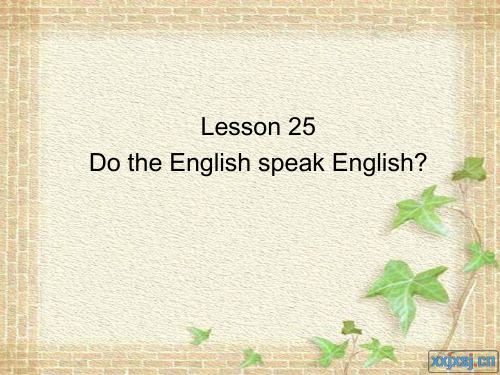
4.wonder
• • • • • • • n.奇观 世界七大奇观:the seven great wonders in the world What a wonder!多么奇妙 It’s a wonder that he survived the plane crash. 短语:No/little wonder No wonder that ……=It’s no wonder that…… e.g.She’s jumping the rail.No wonder her husband dumped her.
3.I did not know the way to my hotel, so I asked a porter. • the way to:to 是介词,介词短语充当the way的定语,类似的如: • 房门的钥匙:the key to the door • 问题的答案:the answer to the question • 大楼的入口:the entrance to the building • 都表示一种由此及彼的方向。
Lesson 25 Do the English speak English?
1. railway
• n.铁路(BrE) = railroad(AmE) • 表示道路的单词: highway,freeway,expressway,motorway • highway:公路 • motorway(BrE) = freeway(AmE) :高速公路(主要指城市与 城市之间的) • express:除了v.表达以外,还可以用作adj,表示快速的、特 快的 • e.g. express service:快递服务 • EMS • express mail service • expressway快速通道(主要指城市内的,例如高架桥)
新概念英语第二册课后练习题答案详解(第25课)

新概念英语第二册课后练习题答案详解(第25课)新概念英语第二册课后习题Lesson 251. ca. The writer didn’t know any English 与课文实际内容不符;b. The porter didn’t speak English 也与实际情况不符;d. The writer was a foreigner 虽然是课文涉及的内容,但不是作者不能听懂搬运工人讲话的真正原因,因为作者也懂英语;只有c. The writer couldn’t understand the porter’s English 最符合课文的实际情况,是准确答案。
2. b根据文章My teacher never spoke English like that!, 只有b. expected everyone in England to speak like his teacher 说出了作者的想法.a. didn't think the porter was English 与事实不符合,文章中没有这样的暗示.c.. doesn't think the English speak English, 不是作者的真实想法.d. thinks that the English speak many different languages虽然作者是这样说的,但是不一定是作者的真实想法.3. b只有选b. is 最符合语法。
a. are 不合乎语法,因为English 做“英语”讲时是单数名词,不能跟复数的系动词are; c. was 也不合乎语法,因为陈述一种语言的性质应该用一般现在时; d. has (有)更不符合语法,因为has 不能做系动词。
4. a这个疑问句是针对次数提问的,回答是several times ,只有a. how many times 多少次,是问次数的。
其他3个选择都不是对次数提问的。
新概念英语第二册Lesson 25

We
love peace, but we are not afraid of war. 我们热爱和平,但是我们并不害怕战争。 He hasn’t arrived. He may, however, come later. 他还没有到,不过,他可能过一会儿来。
You
can phone the doctor. However, I doubt whether he will come out on a Saturday night. 你可以给医生打电话。不过,我怀疑 他是否会在周六晚上出诊。 He said that it was so. He was mistaken, however. 他说事情是这 样的,然而他错了。
这个男孩朗读不仅清晰而且洪亮。 The boy not only reads clearly but loudly as well. 这个棒棒糖(lollipop)不仅好吃还好看。 The lollipop is not only yummy but pretty as well. 这个故事不仅有趣还很激励人。 The story is not only interesting but inspiring as well.
我平安到家了。 I arrived home safely. 我姑姑20分钟后到达墨尔本。 My aunt will arrive in Melbourne 20 minutes later. 派到达了一个小岛。 Pi arrived on a small island.
at last
• 然而搬运工却不明白question several times and at last he understood.
• I repeated my question several times and at last he understood.
新概念英语第二册Lesson 25 (共38张PPT)
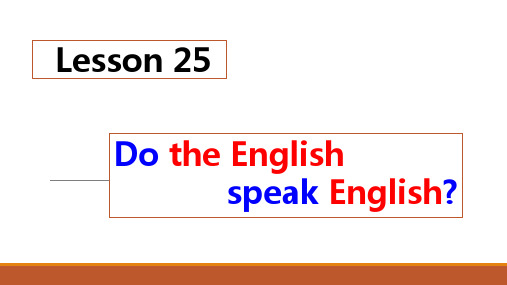
railway n. 铁路;火车站 railway station porter n. 搬运工 several . 几个 表示数量:
some, several, a great number of…
some: 一些, 即可以修饰可数, 又可以修饰不可数 several: 只能修饰可数=a number of(一些) a great number of : 大量的(可数名词)
When will you get to Beijing? How can I get there? get home:到家,get there:到那 home/there都是副词,副词跟动词连用 的时候不需要加介词 I arrived there at last.
I reached the bus stop at five o’clock.
2. I have an apple. Either of you can take it. I want to eat it. Neither of you can take it.
句中either….or…是连词, 意为” 或…或…,是…还是…, 不是…就是…” Either my father or my mother cooks dinner on weekdays 常见的结构有. 1. 连接并列主语, 谓语一般和邻近的主语一致.
His name is Ken. He comes from Handan. He is a Chinese. He is good at (擅长)teaching English. He is a great teacher. He speaks English well.
scientist / English
wonder + if 是否 我想知道你是否有空。 I wonder if you have any spare time. wonder+特殊疑问词 我想知道现在几点了。 I wonder what time it is.
新概念英语第2册Lesson25~27课文详注

新概念英语第2册Lesson25~27课文详注新概念英语第2册Lesson25课文详注1.Do the English speak English? (标题)英国人讲的是英语吗?English在这里均为名词,但意义不同。
第1个指“英国人”,为总称,后面的动词必须用复数;第2个指“英语”。
指语言时前面不加冠词,指人则要加the:The English often talk about the weather.英国人经常谈论天气。
Do you speak English?你会讲英语吗?English还可以作形容词,表示“英格兰的”、“英国的”、“英国人的”等:He was English.他是个英国人。
与English相似的单词有French,Chinese,Japanese 等:I said good morning to him in French.我用法语向他问早上好。
2.I arrived in London at last. 我终于到了伦敦。
(1)这里London前面不加冠词,介词in暗指London是个大地方。
(2)at last为固定短语,表示“终于”,一般暗指经过一番等待、麻烦(苦恼)或努力之后:It was my turn at last.终于轮到我了。
I repeated my question several times and at last he understood.我把问话重复了很多遍。
他终于听懂了。
3.I did not know the way to my hotel…我不知道去饭店的路该怎么走……my hotel不是指属于我的饭店(或旅馆),而是指我已订了房间或者要去住的饭店。
4.I not only spoke English very carefully, but very clearly as well.我的英语讲得不但非常认真,而且咬字也非常清楚。
not only…but…as well这组连接词与 not only…but also是同样的意思,都表示“不但……而且……”,not only 与 but后面的成分必须对等。
新概念英语第二册lesson25

n.铁路 n.搬运工 quantifier.几个 n.外国人 v.感到奇怪
railway
• a system of tracks along which trains run, or a system of trains
• 火车站
• Railway station
• 表示道路的单词:
highway,freeway,expressway,motorway • highway:公路 • motorway(BrE) = freeway(AmE) :高速公路 • express:除了v.表达以外,还可以用作adj,表
• 你不仅要工作而且也要学习。
• You not only need to work but study as well.
Focus on grammar
并列连词 .You must wash the dishes. You must sweep the floor. .You must not only wash the dishes but sweep the floor as well.
• wonder of the world • natural wonder
part 1
• 1 Did you arrive in London or porstmouth? • 2 What was the railway station like? • 3 Did you know your way to your hotel? • 4 Did you ask a porter the way? • 5 What language did you speak to him in? • 6 How did you speak?
新概念英语第二册 NEW CONCEPT ENGLISH 2
新概念第二册课文默写本【二]25-48
![新概念第二册课文默写本【二]25-48](https://img.taocdn.com/s3/m/0caa0e908bd63186bcebbcc1.png)
Lesson 25 Do the English speak English? 英国人讲的是英语吗?Lesson 26 The best art critics 最佳美术评论家Lesson 27 A wet night 雨夜Lesson 28 No parking 禁止停车Lesson 29 Taxi! 出租汽车Lesson 30 Football or polo? 足球还是水球?Lesson 31 Success story 成功者的故事Lesson 32 Shopping made easy 购物变得很方便Lesson 33 Out of the darkness 冲出黑暗Lesson 34 Quick work 破案“神速”Lesson 35 Stop thief! 捉贼!Lesson 36 Across the Channel 横渡海峡Lesson 37 The Olympic Games 奥林匹克运动会Lesson 38 Everything except the weather 唯独没有考虑到天气Lesson 39 Am I all right? 我是否痊愈?Lesson 41 Do you call that a hat? 你把那个叫帽子吗?Lesson 42 Not very musical 并非很懂音乐Lesson 43 Over the South Pole 飞越南极Lesson 44 Through the forest 穿过森林Lesson 45 A clear conscience 问心无愧Lesson 46 Expensive and uncomfortable 既昂贵又受罪Lesson 47 A thirsty ghost 嗜酒的鬼魂Lesson 48 Did you want to tell me something? 你想对我说什么?。
新概念英语第二册 lesson25详尽 版

新概念英语第二册 lesson25 Do the English speak English?标题:English在这里均为名词,但意义不同。
第1个指“英国人”,为总称,后面的动词必须用复数;第2个指“英语”。
指语言时前面不加冠词,指人则要加the:English还可以作形容词,表示“英格兰的”、“英国的”、“英国人的”等;单词:1.★ railway n.rail(铁路)+way(路,途径) rail 扶手,栏杆,围栏railway/train station:火车站 highway 公路 subway 地铁2. ★ several 几个few+可数名词复数 little+不可数名词several+可数名词复数=a number of(一些)several times: I repeated my questions several times.some 一些即可以修饰可数,又可以修饰不可数a great number of… 大量的some time 一段时间 some time ago 一段时间以前sometime adv. 某时 sometimes adv. 有时, 偶尔3.★ foreigner n. 外国人a blue-eyed foreigner 蓝眼睛外国人foreign adj.①外国的,海外的外国留学生:foreign students洋货:foreign goods外交事务:foreign affairs②陌生的e.g. The subject is foreign to us.4.★ wonder v. 感到奇怪① wonder at sth. 对...事情感奇怪I wonder at the beauty of the old town.② I wonder 想要知道: want to knowI wonder if you have friend.③wonder about sth. 对什么感到怀疑what are you wondering about?你对什么感到疑惑呀?④No wonder that… 难怪…No wonder that he is the top student, he works so hard everyday.wonder n. 奇观Jane is a wonder. She never fails in her examinations.the seven wonders of the world in ancient times 世界古代七大奇观wonderful adj. 极好的e.g.I would be a wonderful wife.练习:1. 我想知道她什么时候能来。
新概念英语第二册单词学习Lesson25_27

新概念英语第二册单词学习Lesson25~27新概念英语第二册单词学习Lesson25railway ['reɪlweɪ] n.铁路【单词构造】rail(轨道,铁路)+way(路)= railway(铁路)【单词扩充】railroad铁路【单词搭配】railway station火车站【单词例句】A:I have to arrive at the railway station before .A:我得在10点前赶到火车站。
B: You'd better take a taxi there then.B:那你坐出租车去。
porter[’pa:tal打,搬运工several ['sev(ə)r(ə)l]quantifier几个wicked ['wɪkɪd]最很坏的,邪恶的foreigner ['fɒrɪnə] 外国contain [kən'teɪn] 包含,包装【派生词】container容器【单词扩充】hold容纳【单词例句】A: Are you satisfied with all the clauses?A:这里所育的条款你都满意吗?B: The contract contains basically all we have agreed upon during our negonations.B:合同将我们达成协议的内容基本都写上了。
honesty ['ɒnɪstɪ] 诚实【单词例句】A: Who is that foreigner over there?A:那边那个外国人是谁?B:It's Jill's friend.B:那是吉尔的朋友。
wonder['wʌndə]感到奇怪【派生词】wonderful非常好的【单词搭配】no wonder难怪新概念英语第二册单词学习Lesson26art[ɑːt] 艺术criticsn 评论家;批评者paint [peint]v画【派生词】painter画家【单词扩充】draw画【单词例句】A: What a beautiful picture!A:多漂亮的画啊!B: Yes, Henry is good at painting.B:是啊,亨利很擅长绘画。
新概念英语第二册第25课Lesson 25-new精编版

_d___ I understood.
• a) who • b) whose • c) whom • d) which
• c) overseas
• d) abroad
My teacher never spoke English like that!
• like:prep.像 • He is very like his father. • 她一定也不像她的妈妈 • She looks nothing like her mother. • Like father,like son. • 有其父必有其子
②陌生的 e.g. The subject is foreign to us.
Adj.+er→n. strange→stranger foreign→foreigner light→lighter(打火机)
Question 10
I come from
• a) foreigner
abroad.I am _a____. • b) strange
Question 6
The porter and I looked at each
other.__c___ both
smiled.
• a) I • b) He • c) We • d) They
Then he said something and I understood it.
Question 7
快速通道(主要指城市内的,例如高架桥)
high way
free way
rail: n.扶手,栏杆,围栏
• 出轨: Jump the rail • 楼梯的扶手 : • stair rails • ride the rails • 逃火车票 • 火车站 • railway station
新概念英语第二册 Lesson 25课件
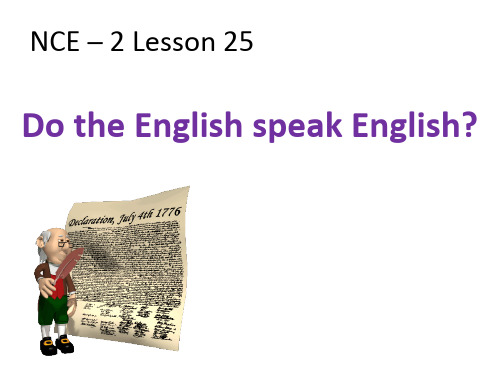
并列句(compound sentence):
➢He teaches English, I teach English. ➢He teaches English and I teach English too. ➢He teaches English and so do I. ➢both...and ➢Both he and I teach English. ➢Mom is a manager. Dad is a manager. ➢Both mom and dad are managers. ➢我吃了一个蛋糕。Sam吃了一个蛋糕。 ➢Both he and I ate a cake.
iarrivedinlondonatlasttherailwaystationwasbigblackanddarkblackanddark又黑又暗blackandblue青一块紫一块arrivedin大地方arrivedat小地方atlast强调努力的结果intheend表示一种结局finally次序上的最后工作不仅是为了赚钱也是为了生活workingisnotonlyformakingmoneybutalsoforlife2
NCE – 2 Lesson 25
Do the English speak English?
Guessing time
singer / Chinese
scientist / English detective/ Japanese
Henry Norman Bethune/ doctor
French/ English
并列句(compound sentence):
新概念英语第二册学生用书Lesson25

Lesson 25 Do the English speak English? 英国人讲的是英语吗??的是英语吗语吗First listen and then answer the question.听录音,然后回答以下问题。
Why does the writer not understand the porter?I arrived in London at last. The railway station was big, black and dark. I did not know the way to my hotel, so I asked a porter. I not only spoke English very carefully, but very clearly as well. The porter, however, could not understand me. I repeated my question several times and at last he understood. He answered me, but he spoke neither slowly nor clearly. ‘I am a foreigner, ’ I said. Then he spoke slowly, but I could not understand him. My teacher never spoke English like that! The porter and I looked at each other and smiled. Then he said something and I understood it. ‘You'll soon learn English!’ he said. I wonder. In England, each person speaks a different language. The English understand each other, but I don't understand them! Do they speak English?New words and expressions 生词和短和短语语railway(1.1)/'reilwei/n.铁路foreigner(1.6)/'forin+/n.外国人porter(1.2)/'p&:t+/n.搬运工wonder(1.9)/'w)nd+/v.感到奇怪several(1.5)/'sev+r+l/quantifier 几个文注释释Notes on the text 课文注1 at last,终于。
新概念第二册课文翻译及知识点【Lesson25、26、27】

【导语】新概念英语作为⼀套世界闻名的英语教程,以其全新的教学理念,有趣的课⽂内容和全⾯的技能训练,深受⼴⼤英语学习者的欢迎和喜爱。
为了⽅便同学们的学习,⽆忧考为⼤家整理了⾯的新概念第⼆册课⽂翻译及知识点,希望为⼤家的新概念英语学习提供帮助!Lesson25 【课⽂】 First listen and then answer the question. 听录⾳,然后回答以下问题。
Why does the writer not understand the porter? I arrived in London at last. The railway station was big, black and dark. I did not know the way to my hotel, so I asked a porter. I not only spoke English very carefully, but very clearly as well. The porter, however, could not understand me. I repeated my question several times and at last he understood. he answered me, but he spoke neither slowly nor clearly. 'I am a foreigner,' I said. Then he spoke slowly, but I could not understand him. My teacher never spoke English like that! The porter and I looked at each other and smiled. Then he said something and I understood it. 'You'll soon learn English!' he said.I wonder. In England, each person speaks a different language. The English understand each other, but I don't understand them! Do they speak English? 【课⽂翻译】 我终于到了伦敦。
新概念英语第二册Lesson25~27重要知识点解析
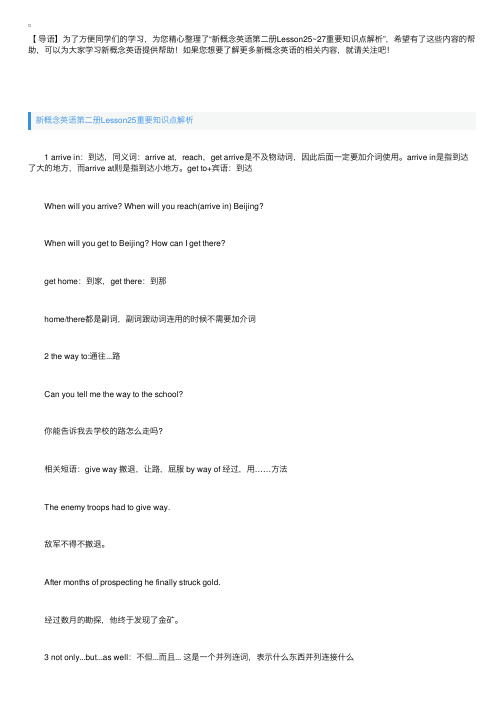
【 导语】为了方便同学们的学习,为您精心整理了“新概念英语第二册Lesson25~27重要知识点解析”,希望有了这些内容的帮 助,可以为大家学习新概念英语提供帮助!如果您想要了解更多新概念英语的相关内容,就请关注吧!
这件事刚刚做完,他们就在篝火上烧起了饭。 本句中,as soon as表示“一……就”,形容前后两个动作连接之紧密。同样表达类似词意的词还有:immediately I came immediately I heard the news. 我一听到这个消息,马上就来了。 3 After a wonderful meal, they told stories and sang songs by the campfire. 他们美美地吃了一顿饭后,就围在营火旁讲起了故事,唱起了歌。 本句中by做介词使用,表示在……附近,靠近,通过。 The house by the lake is a restaurant. 湖边的那座房子是家饭店。 与by搭配的其它词组包括:by means of 经由,用……方法 by far 截止到目前 by accident/by chance 偶然 Thoughts are expressed by means of words. 思想是用(通过)言语表达的。 I met her quite by chance. 我遇见她完全是偶然的。 The TV tower is by far the largest construction of our country. 电视塔明显地是我国的建筑。 4 creep vi. 蹑手蹑脚地走, 爬, 渐渐出现, 蔓延, 毛骨悚然 n. 卑鄙小人, 爬, 徐行, 蠕动
- 1、下载文档前请自行甄别文档内容的完整性,平台不提供额外的编辑、内容补充、找答案等附加服务。
- 2、"仅部分预览"的文档,不可在线预览部分如存在完整性等问题,可反馈申请退款(可完整预览的文档不适用该条件!)。
- 3、如文档侵犯您的权益,请联系客服反馈,我们会尽快为您处理(人工客服工作时间:9:00-18:30)。
Teaching Aims
• By the end of this lesson, my students will…. • 1. enjoy learning English with me. • 2. be able to write down the whole passage basing on memory (dictation) • 3. Act out the whole story( individual, pairs, groups)
but like the Dicos as well.
Notes on the text 课文注释
4 neither…nor ...,既不…又不…,这个结构所连 接的两个否定概念也必须是对等的成分。 I neither like the KFC nor like the Dicos.
5 Iike that,像那样。介词短语作状语,修饰动词 spoke。like像......一样 Like father,like son.
6 the English,英国人。与定冠词连用,表示一个 群体,所跟的动词用复数。
C。视听理解及听写生成-- 10分钟
• 在这一环节里,老师将连续播放视频6次,学过生词的你需要认真观看并理解,因为随后老师将最小化视频 成为音频,而你需要在随后的另6次连续播放中完成句子听写。
• 老师将就播放内容问你一些问题(全部来自摘要写作中)来查证你的理解程度。 • 在完成2幅图的所有句子之后,老师将和你过渡到下一环节。
Notes on the text 课文注释
1 at last,终于。经过努力得到的结果。 I went home at last.
2 the way to my hotel,去(我住的那家)饭店的路 。
It's the way to the ONLY school. 3 not only…but ... as well,不但…而且……,与 not only…but also是同样意思,所连接的前后两部 分的成分必须一致。 I not only like the KFC,but also like the Dicos.
3.我不知道去饭店的路该怎么走,于是向 一个搬运工打听。
3. I did not know the way to my hotel, so I asked a porter.
D。逻辑推理与背景文化价值观-- 10分钟
• I arrived in London at last. The railway station was big, black and dark. I did not know the way to my hotel, so I asked a por ter. 伦敦车站大且暗,敢问宾馆路何方。
• 逻辑:放下行李一看,大车站黑暗一片,更糟的 是宾馆的路不知道,作者只好问搬运工了!下文 应是问话的内容与方式了。
带问题听文章
First listen and then answer the questions.
1 How is the railway station?
2 Why does the writer not understand the porter?
3 What did the porter say to the writer?
arrive in到 达
• 1).arrive in +大 地点
• 2).arrive at+小地 点
• 3).get to +地点
• 4).reach+地点
词汇配对
1.到达
2.搬运工 3.也,和 4.外国人 5. 感到奇怪 6.互相 7.几个 8.铁路
A。porter B。as well C。railway D。wonder E。several F。each other G。arrive in H。foreigner
教学步骤(单数课—60分钟)
• A。精彩导入—5分钟 • B。生词学习---6分钟 • C。视听理解及听写生成-- 10分钟 • D。逻辑推理与背景文化价值观-- 10分钟 • E。口语操练与口语产品(表演)生成-- 15分钟 • F。语法归纳与练习-- 15分钟 • G。考试链接-- 10分钟
• A。精彩导入—5分钟 • 思考问题: • 1.在中国,有哪些地方话接近于标准
普通话?哪种地方话有普通话的影子 但即使是中国人也只能听懂大部分? 一个英国人,在英国学了标准普通话, 到中国能听懂正宗的四川话吗? • 2.一个外国学生,学了标准英语,到 了英国能听懂当地的英语吗?
B。生词学习---6分钟 New words and expressions 生词和短语
railway
4 Do they understand each other or not? Does the writer understand them? (but)
1.我终于到了伦敦。 2.火车站很大,又黑又暗。
1. I arrived in London at last. 2. The railway station was big, black and dark.
language/food • 3).offical
language
someone from another country
foreigner
a blue--eyed foreigner
wonder (v)wonder at sth
(n).the seven wonders of the world wonderful adj. wonderful mother
3. porter
• 1).--port港口 • 2).airport l
a number of people or things that is more than two or three, but not many
foreigner
• 1).foreign外国的 • 2).foreign
